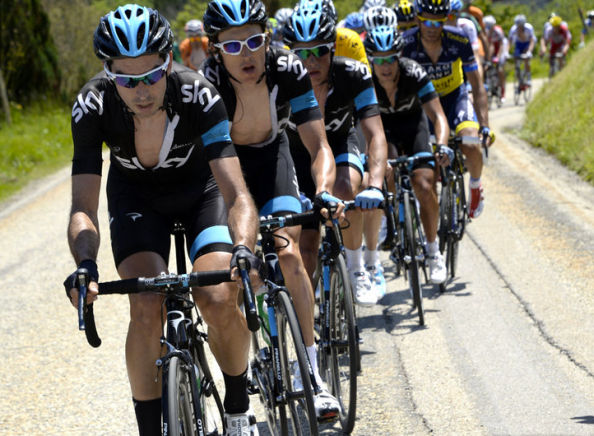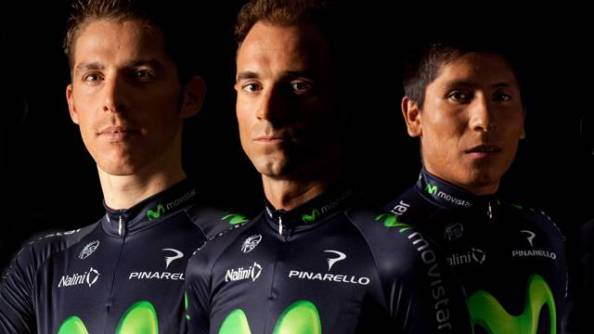
A familiar sight: Team Sky on the front (Photo: Team Sky)
It’s a problem that will have Directeurs Sportifs scratching their heads yet again during the Tour de France, and it isn’t going to go away any time soon. Team Sky’s tempo riding on ascents with its train of deluxe domestiques is revolutionising cycling on a dramatic scale. Gone are the days of the stop-start battles of a few years ago played out by Alberto Contador and Andy Schleck on the long mountain passes: this is a very different kind of cycling that has emerged over a short period of time.
In the 2012 Tour de France, Team Sky exercised an authority over the race that asphyxiated the opposition. They were almost entirely unthreatened by rival teams for the duration of the race; the depth in quality of Sky’s roster ensured that there was no shortfall in support at any point. For this reason, Wiggins was untouchable. You may remember Wiggins shaking his head in front of the cameras, after news had come through that the team had lost an outstanding servant in Konstantin Siutosu to a fall on the third stage. But, ultimately, Team Sky barely seemed to miss him. Indeed, the only serious problem that Wiggins encountered, as we know, was the astonishing strength of his most super of domestiques, Chris Froome.
If Sky’s unromantic (but more importantly successful) approach to tactics leaves you underwhelmed, then it won’t be much comfort to you that this year is going to look decidedly similar to last year. But there are differences. This Sky squad is not quite as strong. It provides a glimmer of hope for the other teams, who must be aggressive, but also measured in their aggression. Let me explain.
To simplify matters, last year team Sky had four riders climbing at an exceptional level in a hierarchy that looked like this: Porte (4th man) – Rogers (3rd man) – Froome (2nd man) – Wiggins (leader). Take Wiggins and Rogers out of the equation this year, and you’re left with Richie Porte playing the role that Froome was doing (a little too well) last year. Based on what we saw in the Dauphiné, this could be the hierarchy for this year’s race: Kennaugh (4th man) – Thomas (3rd man) – Porte (2nd man) – Froome (leader). As well as Kennaugh and Thomas have been climbing, this a weaker quadrumvirate. Sky also have Siutsou and David López at their disposal, who could occupy roles as fourth or third men. At this point it’s hard to say. Then add in Vasil Kiryienka, arguably the most valuable domestique in the world. The reality, then, is that this is still a fantastically strong team.
However, the gap in ability between the third man and Richie Porte could potentially be exploited. There are only two teams who I feel have the ability to manage this, and they are Movistar and Saxo-Tinkoff. Let’s say that if they were to have trains of their own, then they would probably look like this:
Movistar: Amador (4th man) – Costa (3rd man) – Quintana/Valverde (2nd man & leader)
Saxo Tinkoff: Roche (4th man) – Kreuziger/Rogers (3rd & 2nd man) – Contador (leader)
This is genuinely strong support, something Vincenzo Nibali was sorely lacking at Liquigas last year. I think both of these teams should feel reasonably confident that they can ‘make something happen’ with their fourth or third men. By this I don’t mean that the Kreuzigers and Amadors should be blindly attacking as soon as Sky are down to four riders, because that won’t work. Sky won’t respond to those attacks, and they don’t need to, because time and again the attacker loses his short-lived gap when he cannot sustain the effort.
Instead, imagine a scenario where Tour de Suisse winner Rui Costa accelerates with Quintana and Valverde on his wheel. Perhaps Contador and Rodríguez also go with the move. How does Sky react then? Can Porte single-handidly bring back such a group? Or does Froome go after the leaders and isolate himself? This is all very hypothetical, but it would seem that Sky’s opponents need to premeditate their advances with a pragmatism that mirrors the very thing they are trying to beat.

Rui Costa, Alejandro Valverd and Nairo Quintana: the men to upset the apple cart? (Photo: Cycling Central/AFP)
If I were Chris Froome, I’d be more worried about Nairo Quintana than anyone else. As Froome’s pointed out, he’s had the measure of Contador this year, but Quintana is an unravelling enigma, rapidly evolving. He can climb well, descend well (though he’s had a few problems this year in that respect) and should manage a good time trial on Stage 17’s tough course. Valverde starts the race as team leader, but don’t be surprised if Quintana ends the race as Movistar’s no.1.
We can say with (almost) absolute certainty that Chris Froome will be the strongest climber in the race. I completely agree with Thibaut Pinot’s observation: ‘only if [Alberto Contador, Joaquim Rodriguez and Alejandro Valverde] race united at the Tour, Porte will be forced to pace a lot. But if they are selfish, it’ll be hard to beat Froome.’ It’s important to remember that these three riders are not just united in their common motive of defeating Froome, because there’s something else. Nationality. This counts for something. Meanwhile, Pinot may speak as a spectator, but he too will have a part to play in the most difficult mountain stages.
Contador and co. know full well that passivity will play perfectly into Sky’s plans, so I think we do have a race on our hands. Otherwise, they’ll be racing Richie Porte for second place.
Of course, all the above is reliant on crashes not affecting the key riders in the big teams. Three days in Corsica will be hectic and stressful, and there will unfortunately be victims before we even reach mainland France. This is a part of what makes cycling an utterly unpredictable and compelling sport. Without luck, winning isn’t an option.
Posted on June 26, 2013
0